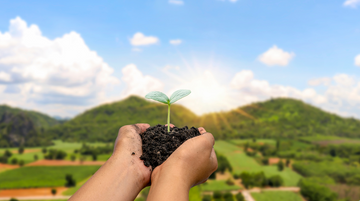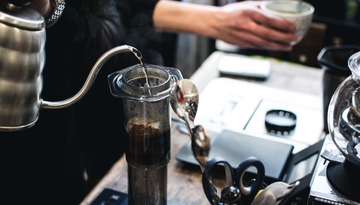
The Magic Factor - The Superior Taste of Whole Bean Coffee
If you are drinking in North America, your coffee traveled a long way before reaching you. Depending on the path it took, it might have been subjected to a variety of different treatments - different roast profiles, flavor additives, preservative treatment, among the few.
When it comes to the taste and nutritional content of your coffee, perhaps the most significant treatment is one people may not consider especially important: Grinding. Grinding your beans the moment before you brew coffee not only enhances their taste, it increases the nutritional value of coffee . There great reason to do this, as coffee is a food so dense in anti-oxidants, it makes other foods embarrassed.
In this article, we'll cover why switching to whole bean coffee may be the most high-leverage investment towards enhancing your experience.
Why is Whole Bean Coffee Better?
The coffee bean, which carries an abundance of flavorful compounds and antioxidants, serves as a protective shelter against the corrosive effects of oxygen and other free radicals. However, these compounds are only stable and effective while confined within the bean. The moment we grind them, they escape into your kitchen air, and into your nostrils. At this point, we don't have much time before those compounds begin to dissipate and oxidize, thereby losing their core essence.
This dynamic makes it especially important to delay the grinding process up until the last moment. Whereas coffee that was pre-ground months ago is essentially caffeinated dirt, freshly ground coffee still retains some of the essential sugars and fats that taste so delicious.
Does Pre-Ground Coffee go Bad?
If going by the metrics of flavor molecule density and nutritional content, then yes. Pre-Ground coffee often sits on shelves for months before turning into your brew. As ground coffee is much smaller in particle size, oxygen has more opportunities to strip it of its tasty content.
Below are some additional points to consider when deciding to make the switch.
Ground Coffee Loses its natural flavor in just 20-30 minutes.
As stated above, a ground coffee molecule is a tiny thing. This makes it easier for nasty invaders to sneak in, envelop, and trash the place. For a whole bean, this is a difficult task to undertake, as it is comparatively enormous, and therefore will take much longer to decay.
Whole Bean Coffee offers more Versatile Grinds.
Your brew method will largely determine your grind size. For instance, a French Press calls for a coarse grind, which you’ll find in very few store bought pre-ground coffees. Whole Bean Coffee, with the right grinder, allows you to pair grind size with your preferred brew method. This is a key component of producing and refining your perfect cup, and an easy undertaking – simply google the grind-size for your preferred brew method, and grind accordingly. Some apathetics out there might claim that it makes no difference what grind-size you use. But as a calm, cool, and collected Mellö Fellow, you know the best things in life take just a little extra love. If you're performing this ritual every day of your life, why not perfect it?
Whole Bean Coffee is a dedication to Craftsmanship, and Happiness.
Studies have shown that a sense of competence in our day-to-day activities is directly correlated to feelings of happiness and fulfilment. Most of us drink coffee every single morning, yet the quality between our preparation of that coffee varies wildly. However, bringing your cup from a 5/10 to a 8/10 might be as simple as buying a grinder, and switching from pre-ground ground to whole. This is a worthy investment to make for an action you’ll likely repeat for the majority of your life’s remaining mornings. With each passing day, we only have so many cups of coffee left to drink. So why not make each and every one of them as special as you can?




